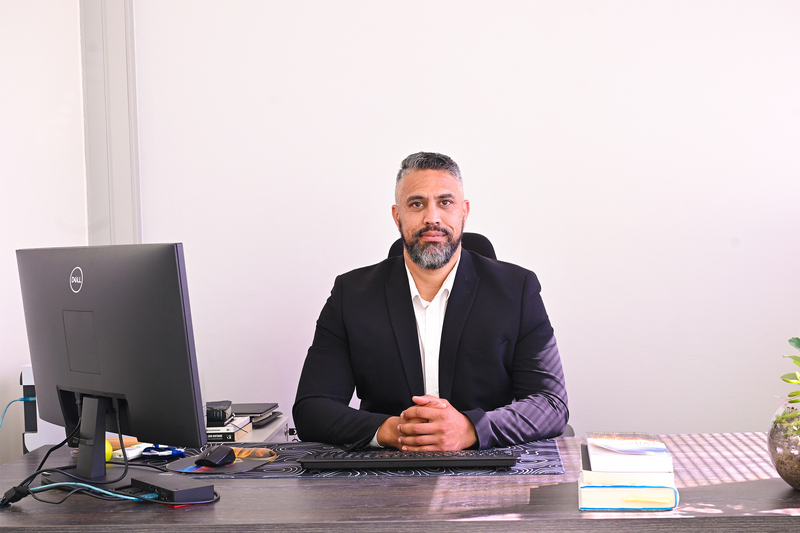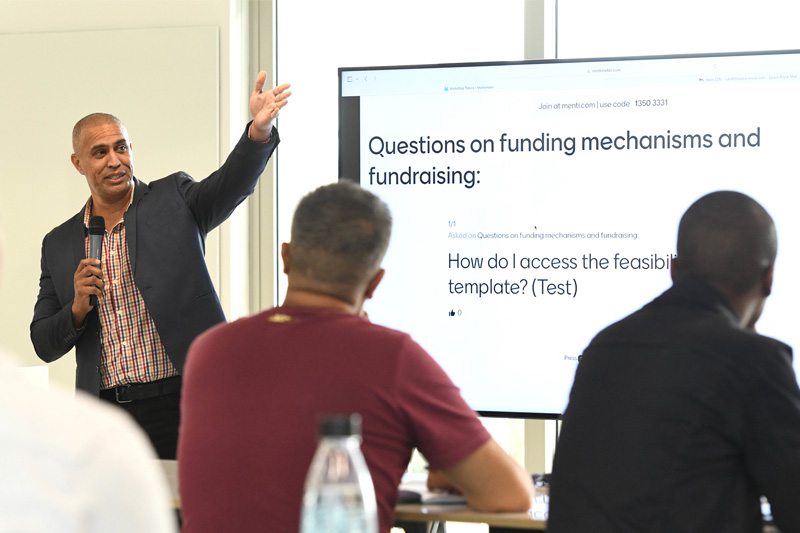Shaping future-ready graduates
29 October 2025 | Story Myolisi Gophe. Photo Lerato Maduna. Read time 6 min.
When Stafford Bomester took up the reins as the director of Careers Service at the University of Cape Town (UCT) in October 2024, he brought with him nearly two decades of experience in fundraising, marketing and stakeholder engagement.
But for Bomester, this move marked more than just a career transition – it was an opportunity to help shape a new generation of students who are not only employable but also innovative, socially responsive and future-ready.
“I’ve spent close to 20 years in fundraising and marketing, both at UCT and in other institutions,” he explained. “But I wanted to explore another area of professional development – one that works more directly with students. This role allows me to use my corporate and stakeholder engagement experience while contributing to student growth in a meaningful way.”
Before joining UCT in 2022 as the head of fundraising in the Development and Alumni Department (DAD), Bomester spent eight years at the University of the Western Cape (UWC), where he also completed a postgraduate diploma in business administration. His earlier qualifications include a master’s degree in international development administration from the Andrews University in Michigan in the United States and undergraduate studies at Helderberg College of Higher Education in Somerset West.
The transition from development and advancement to career education, he said, was driven by a deep desire for new challenges and impact. “I quite enjoy new challenges. After years in fundraising, I wanted to explore another area of development: helping students prepare for life beyond university.”
Professionalising student support
At the heart of his vision for UCT’s Careers Service is a simple but powerful goal: ensuring the department runs “professionally and adequately” to meet the diverse needs of UCT’s student population. With a team of 14 staff serving close to 30 000 students, that’s no small feat.
“Our responsibility is to make sure that every student who walks through our doors is equipped with the tools to transition successfully into their chosen path,” he said. “That includes building professional profiles, refining CVs, and developing the networks and skills they need, not only to find jobs but to create opportunities for themselves.”
Careers Service engages students as early as their first year, introducing them to career readiness from orientation week. The team offers one-on-one consultations, employer exhibitions, entrepreneurship events and career expos – like the recent Epic Job Expo held at the Sports Centre – where close to 5 000 students could connect with 100 industry partners.

“We want students to think about their futures from day one,” said Bomester. “That means preparing them for meaningful engagement after graduation, whether that’s employment, further study, or entrepreneurship.”
One of Bomester’s key focus areas is strengthening mentorship opportunities for students, particularly first-generation university attendees who may lack access to professional networks.
“Many of our students are the first in their families to attend university. They often experience both the joys and challenges of higher education without much professional guidance,” he noted.
To bridge this gap, Careers Service is collaborating with DAD to design a student–alumni mentorship programme. The initiative will pair students with alumni working across various industries and sectors.
“The idea is to help students learn from those who’ve walked similar paths,” Bomester explained. “Whether they’re preparing for corporate environments or pursuing entrepreneurship, mentorship can make a huge difference in helping students navigate their journeys.”
Fostering entrepreneurial thinking
While traditional employment remains a key focus, Bomester is passionate about embedding entrepreneurial thinking across the university – a goal closely aligned with UCT’s Strategy 2030.
“My personal passion is not only to improve graduate employment statistics but to encourage students to think differently,” he said. “Entrepreneurial thinking should be embedded in all programmes, so that even those who enter the traditional job market bring innovation into their workplaces.”
For him, entrepreneurship extends beyond profit-making. “It’s about social innovation: identifying problems in communities and developing creative, sustainable solutions that have real impact,” he added. “If we can grow this mindset, we’ll produce graduates who don’t just fill existing roles, but who create and drive innovation.”
“If we can empower students to think ahead, to be adaptable, and to see themselves as changemakers, then we’re not just preparing them for jobs – we’re preparing them for life.”
Careers Service also tracks graduate outcomes closely to inform its strategies. According to internal data, 80% of UCT graduates are “meaningfully occupied” after completing their studies – whether through employment, further study or self-employment.
Bomester sees these figures not as endpoints, but as indicators of where to focus next. “The numbers are encouraging, but for me, it’s about continuous improvement,” he said. “We want to understand where the gaps are – both in industry expectations and student preparedness – and then work with academic departments to address those.”
Reflecting on his first year in the role, Bomester attributes much of his progress to the unwavering support of his dynamic Careers Service colleagues and the broader university community – particularly the Centre for Higher Education Development (CHED), where Careers Service is based.
“I’ve received tremendous support from the executive leadership, faculty deans, and the broader university leadership,” he said. “I would especially like to acknowledge Professor Kasturi Behari-Leak, the dean of CHED, for her guidance and encouragement. It has truly been a privilege to step into this space with such strong backing.”
For Bomester, the ultimate goal is to build a culture where career development and entrepreneurship are not afterthoughts but integral parts of the UCT student experience.
“If we can empower students to think ahead, to be adaptable, and to see themselves as changemakers, then we’re not just preparing them for jobs – we’re preparing them for life.”
 This work is licensed under a Creative Commons Attribution-NoDerivatives 4.0 International License.
This work is licensed under a Creative Commons Attribution-NoDerivatives 4.0 International License.
Please view the republishing articles page for more information.










